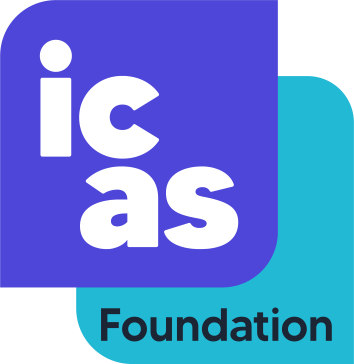The ICAS Foundation aims to help students facing social and economic barriers to access higher education and study accountancy and finance at university. We believe in, and want to play our part in creating a fairer and inclusive accountancy profession. We primarily focus on assisting students faced with a financial disadvantage, living in a household where the annual income in under £34,000 - we also monitor the ethnic and social diversity of our applicants and students to ensure we are reaching potential accountancy and finance students from a wide range of backgrounds and where there is the greatest need.
We consider all applications to join the ICAS Foundation in context, to ensure we look at every applicant's individual circumstances and equal opportunities are available to everyone who applies.
Financial Diversity
As part of our eligibility criteria for joining the ICAS Foundation programme, students must be from a household where the annual parental, guardian or household income is below £34,000. The majority of our new students each year come from households with an annual income of under £20,000:
- Between 2017 and 2019, and in 2021 and 2023, these students accounted for between 73% to 82% of new starts.
- In 2024 these accounted for 68% of new starts. (This reflects an increase in National Minimum Wage, meaning a student living in a single-parent home, where the parent works full time in a minimum wage role, would no longer be eligible for maximum funding.)
- In 2022 these accounted for 46% of new starts. (While this was still the largest group of new starts, it may indicate that students from lower income households chose not to start university during the cost of living crisis beginning mid-2022.)
- In 2020, the majority of our new students came from households with an annual income between £20,000 and £34,000. (This may suggest that students from lower income households chose not to start university during the early uncertainty of the COVID-19 pandemic.)
Social Diversity
Scottish applications / (successful applications) assessed by their postcode in the 2020 Scottish Index of Multiple Deprivation
(See the Scottish Government website for more information on the SIMD measure.)
| Year | % of applicants / (successful applicants) in SIMD Deciles 1-3 | % of applicants / (successful applicants) in SIMD Deciles 4-6 | % of applicants / (successful applicants) in SIMD Deciles 7-10 | % of applicants from outside Scotland |
|---|---|---|---|---|
| 2024 | 33% (36%) | 15% (16%) | 19% (19%) | 33% (29%) |
| 2023 | 38% (32%) | 19% (29%) | 26% (18%) | 18% (21%) |
| 2022 | 46% (35%) | 18% (27%) | 20% (24%) | 16% (14%) |
| 2021 | 38% (38%) | 26% (21%) | 23% (24%) | 14% (17%) |
| 2020 | 35% (31%) | 25% (17%) | 24% (31%) | 16% (21%) |
| 2019 | 43% (56%) | 21% (19%) | 21% (22%) | 15% (3%) |
| 2018 | 49% (44%) | 15% (13%) | 27% (38%) | 8% (6%) |
| 2017 | 31% (42%) | 11% (13%) | 20% (29%) | 38% (16%) |
Ethnic Diversity
As part of our application process, we ask students to voluntarily disclose their self-identified ethnic background (if they choose to do so) to help us improve our ethnic diversity monitoring.
In 2024:
- 58% (2023: 57%, 2022: 65%, 2021: 55%, 2020: 52%) of our successful applicants identified as white / British or UK home nation.
- 26% (2023: 11%, 2022: 14%, 2021: 24%, 2020: 31%) identified as non-white or other ethnic background / British or UK home nation.
- 16% (2023: 32%, 2022: 21%, 2021: 20%, 2020: 17%) identified as coming from a background unrelated to Britain or a UK home nation, or chose not to disclose their ethnic background.
Gender
Applications / (successful applications) assessed by self-identified gender
| Year | % of applicants / (successful applicants) identifying as Male | % of applicants / (successful applicants) identifying as Female |
|---|---|---|
| 2024 | 54% (42%) | 45% (58%) |
| 2023 | 54% (43%) | 46% (57%) |
| 2022 | 52% (43%) | 48% (57%) |
| 2021 | 39% (34%) | 61% (66%) |
| 2020 | 50% (45%) | 50% (55%) |
| 2019 | 49% (44%) | 51% (56%) |
| 2018 | 40% (48%) | 60% (52%) |
| 2017 | 58% (56%) | 42% (44%) |
